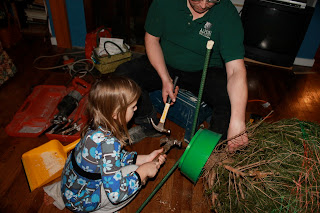Our family tradition is to go out in the bitter cold, search through the entire tree farm, and finally select the perfect tree and cut it down ourselves. I love the smell of pine needles and the warm glow of lights against the green boughs. The myriad of ornaments sparkle gently amid the twinkling lights, reflecting the diversity and memories of Christmases gone by. Each year we add another ornament to our collection, so that now each of us children has our own box of keepsake ornaments. As we lovingly hang the delicate bulbs and memorable baubles, I recall the family memories tied in to each treasured keepsake. Working together, we create a Christmas tree that reflects both our individuality and our unity as a family.
This year was no different than years past. We drove out in the morning with our trailer and braved the snowless cold (yet warmer than previous years) to discover the perfect tree. This is a long and detailed process which involves analyzing every single potential tree.
This tree was too tall, but my musical sisters decided it was a conductor.
We found several trees just the right height –– for my littler sisters. So we had to keep looking.
This tree was bent sideways, so we got some interesting photos pushing and pulling it to the ground.
Finally, after much debate and deliberation, we found the perfect tree.
Oh yes, no Christmas tree search with my family is complete without numerous cups of hot chocolate.
Finally victorious, we carry the tree towards the trailer.
And sit in regal state with the tree.
Once we arrived home (and waited several hours), my father drilled a hole in the base and helped hammer the tree stand into place.
The next job is the lights. I’m in charge of hanging the lights, which went rather smoothly this year with much help from my sisters. After the lights are up, all of us hang our ornaments upon our own sections of the tree.
And finally, once all the ornaments are hung, the floor rugs are laid and the presents placed beneath the tree. The finished Christmas tree is a truly beautiful sight to see. As I gaze at the shimmering ornaments and shining lights, I reflect on the joy of Christmas and the wonderful blessings and memories I have received and created over the years. As we enter this final week of Advent, I wish you all a blessed octave before Christmas and a Merry Christmas!



















































